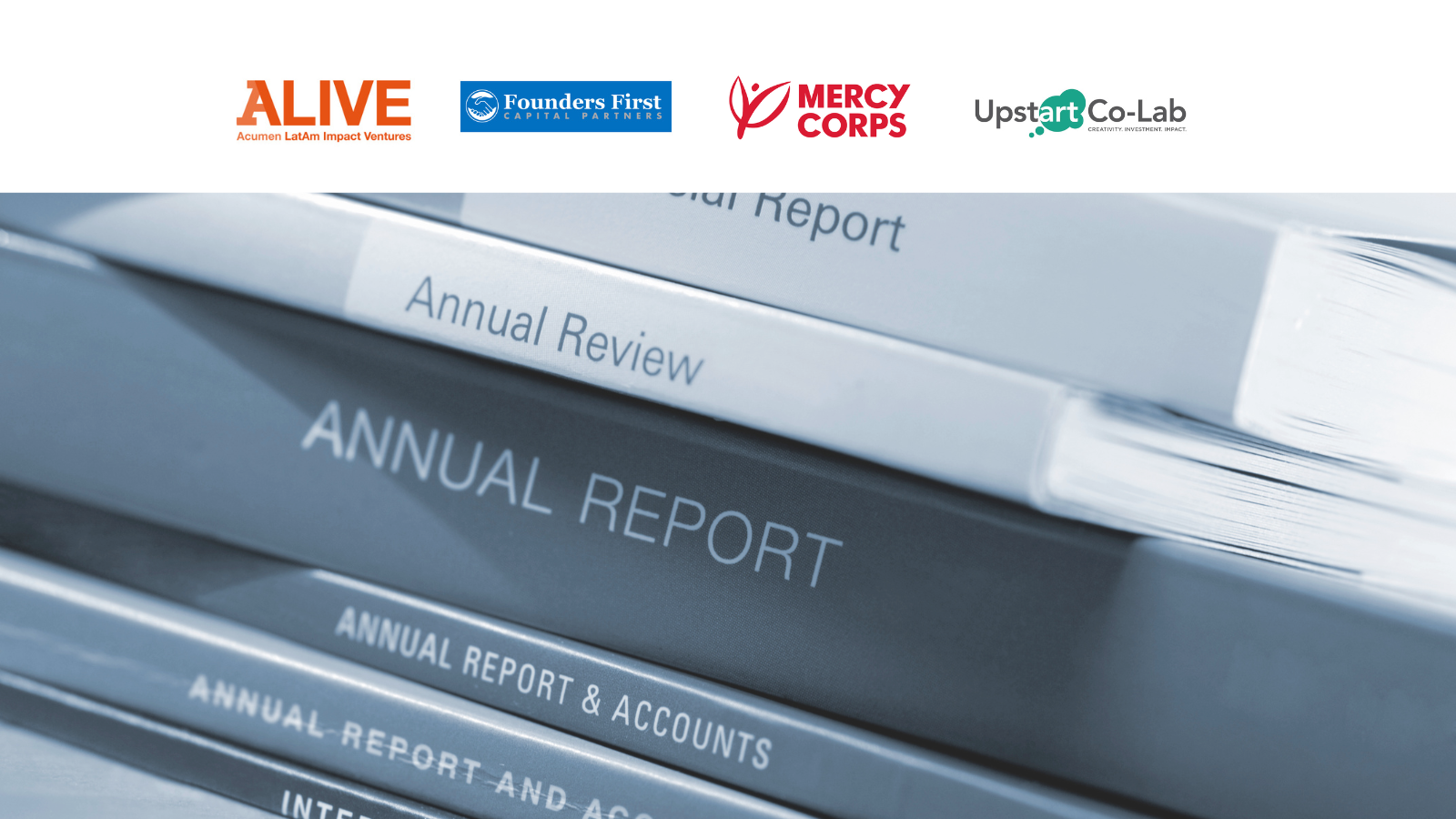ImpactAlpha, March 22 – One fund tracks the number of informal-economy jobs its portfolio companies have formalized. Another firm reports how its investments improve quality jobs and sustainable livelihoods. And a third investor looks at the increased revenues and property values of end-user borrowers.
Looking across the latest batch of impact reports to land in our in-box, it’s difficult to make apple-to-apples comparisons of their actual impact. Indeed, impact reports come in all shapes and sizes (see earlier editions here and here).
“Impact reporting is inherently more context-dependent and therefore does not lend itself as readily to standardization of data in the way that financial reporting does,” the consultancy BlueMark says in an FAQ on impact reporting that accompanies our latest roundup.
But the reports provide starting points from which to interrogate the effectiveness of impact strategies. For example, Founders First, which helps bridge capital gaps for diverse-led businesses, found that of 644 businesses that came through 54 accelerator cohorts, more than half have increased revenues, with an average increase of 78%. Three out of five have attracted new funding totaling $65 million. The companies have created 606 jobs.
Through 25 years and five recessions, “I have seen just about every challenge that small businesses have to endure,” Founders First’s Kim Folsom says in the firm’s impact report.
BlueMark’s framework for impact reporting keys on the completeness and reliability of the reported information. The firm regularly fields queries from clients about what information to include and how to integrate it with financial reporting. Key elements: objectives and expectations, relative metrics, relative performance results, stakeholder perspectives and transparency into risk and lessons learned.
Founders First: Revenue-based financing for diverse-led businesses
Founders First majors in the minors. Rather than chase a relatively few would-be tech unicorns with billion-dollar valuations, the San Diego-based firm helps bridge the capital gap for many more diverse-led operating businesses, each valued in the millions or tens of millions.
Through Founders First Community Development Corporation, its nonprofit accelerator, and Founders First Capital Partners, a source of direct revenue-based funding, the firm aims to fund 1,000 companies and train-up another 5,000 by 2030. Founders First latest impact report takes stock of the progress.
- Growing diverse businesses. Founders First is intentional about supporting and funding underserved small business owners, including those led by women, people of color and LGBTQIA+, veterans and those in low-to-moderate income areas. It measures impact through six key metrics: job retention, job creation, increase in revenues, funding raised, profitability and creation of new revenue streams.
- Measuring progress. Through 54 accelerator cohorts, Founders First has supported 644 companies. Of the companies that have received any funding, 60% of founders identified as female. Founders in these companies were 45% Black, 25% white, 15% Hispanic or Latinx, 6% Asian and 5% were two or more races. Roughly 60% have added new recurring revenue streams. Three quarters increased revenues, with an average increase of 78%. More than half received funding post-graduation (for an estimated total of $65 million). The companies have created 606 jobs.
- Non-dilutive capital. From its investment arm, Founders First provides revenue-based financing, money lent to companies in return for a percentage of revenues until the initial loan amount and repayment cap have been paid off. Founders First has deployed $5 million to 27 companies. Invested companies have seen revenues increase by an average of 26% within two years after funding. A third of the investments were made into businesses in low-to-moderate income areas.
ALIVE: Embedding a gender lens to serve low-income customers
Acumen Latin America Impact Ventures, or ALIVE, invests in companies serving low-income communities. ALIVE’s capital comes with requirements that portfolio companies level-up their gender inclusion game. The firm says it “incorporates gender-lens investing every step of the way, from origination to post-investment management.”
In its latest impact report, ALIVE says it is reaching 7.8 million students, up 23% from last year, and 49,000 renewable energy beneficiaries, up 15%. It has helped formalize almost 60,000 jobs, a 186% increase, and currently serves 626 small and medium enterprises, up 48%. Acumen also surveys end customers and beneficiaries to track quality of life improvements.
With uPlanner, a Chilean edtech company that helps universities anticipate student hardships and dropouts, ALIVE saw an opportunity to help the overwhelmingly male-led company implement gender-based recruitment and retention practices. uPlanner grew its female employee base to 33% from 25% over nine months, and boosted female representation in operations to 25% from 14%. Next up: improve the gender ratio of uPlanner’s leadership and board, neither of which have female representation.
- Good for business. ALIVE works with advisory firm Value for Women to “understand how gender-focused strategies improve business performance, not in some abstract way, but in real, applied ways for their own business.” Across ALIVE’s portfolio, 48% of company employees are women and 35% of company leadership positions are filled by women, compared to Latin American averages of 41% and 7% respectively.
- Walking the talk. ALIVE is run by two male managing partners. Its investment director, who is responsible for deal origination, structuring and administration, is a woman. Overall, 50% of the team is female.
Mercy Corps Ventures: Catalyzing a resilient future in emerging markets
Climate change. Financial disruption. Pandemics. Amid seemingly endless crises, Mercy Corp Ventures is investing in systems and infrastructure that are resilient and inclusive, especially for the world’s most vulnerable people and communities.
That opportunity is reflected in the group’s new “resilient future” investment thesis, which includes cutting edge solutions across adaptive agriculture and food systems, frontier fintech, and climate-smart systems.
“The market downturn has only emphasized the importance of our mission to catalyze an ecosystem of venture-led solutions to strengthen the resilience of individuals and communities in frontier markets,” Mercy Corps Ventures says in its latest impact report. “The bear market is a time to build, and we believe that companies with diverse teams that embed resilience in their business models will be the ones most likely to scale and succeed.”
- Investing in resilience. MCV, the impact investing arm of global development agency Mercy Corps, made a dozen investments last year. The portfolio includes Cinch, a Kenya-based land aggregator and management company, Verqor, an agricultural services and cashless credit platform for Mexican farmers, and Kwanza Tukule, a logistics company for informal street food vendors. That brings Mercy Corps’ portfolio to 41 companies and $5.8 million invested since it was launched in 2015.
- Impact metrics. The group tracks follow-on funding ($334 million to date), the percentage of women-founded startups in its portfolio (51%) and follow-on funding flowing to women (21 out of 49 such deals). It also measures impact on end-customers. In 2022, MCV portfolio companies served 4.4 million customers, including 1.3 million women and smallholder farmers, increased revenues and property values of end-customers by $19.3 million, and facilitated $248 million in financing to individuals and small businesses.
- Beyond a gender lens. MCV has begun broadening its diversity, equity, and inclusion commitments to include local and proximate founding teams and other opportunities for impact. “We really need to highlight the different ways to think about gender for our portfolio companies – on boards, as employees, within customer segments, or in creating products and services for women,” says Mercy Corps Ventures’ Lillian Alexander.
- Next up. MCV is looking to launch a second fund, the Resilient Future Fund, to invest in and support approximately 25 early-stage startups in frontier markets with solutions that build resilience to climate change.
Upstart Co-Lab: Investing for a creative and inclusive economy
When Laura Callanan launched Upstart Co-Lab in 2016, she hoped to find investable creative economy deals for impact investors. In its new impact report, “Investing for an Inclusive Creative Economy.” Upstart highlights a current pipeline that includes 300 creative economy-focused funds, companies and real estate projects targeting more than $2 billion in the next two years. The pipeline covers five segments of the creative economy, from sustainable food and ethical fashion to social impact media, creative places and other creative businesses.
The New York-based nonprofit has mobilized $23 million since inception for creative economy investments from its investor community, which includes the Souls Grown Deep Foundation, BRIC, Builders Initiative, Jessie Ball duPont Fund, Creative Capital and artist and entrepreneur Neil Hamamoto. Upstart sources, screens and performs investment due diligence on behalf of its investor members.
- Impact metrics. Upstart’s impact assessment strategy includes tracking how the investments improve quality jobs and sustainable livelihoods, vibrant communities and access to capital for Black, minority and women entrepreneurs. Upstart also tracks the environmental sustainability of the funds and companies in the pipeline. Entities led by Black, Indigenous and other people of color, as well as women, make up more than half of the current pipeline.
- Creative portfolio. Examples of portfolio funds and companies backed by Upstart’s investor community include the Colorado Enterprise Fund, Community Investment Management, Paskho and Self-Help Credit Union. Upstart says the portfolio of investments proves out its thesis that the creative economy can be a driving force for social and economic inclusion, good jobs and vibrant communities. The nonprofit is looking to raise up to $100 million from foundations, donor-advised funds and endowed cultural institutions to fully demonstrate the potential of the creative economy for impact investing.
- Aligning endowments. American museums and other cultural institutions, with combined endowments of more than over $64 billion, are starting to align investments with values of diversity, equity and inclusion, and are supporting Black, minority and women fund managers and businesses.











